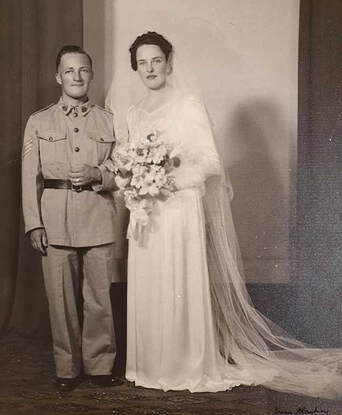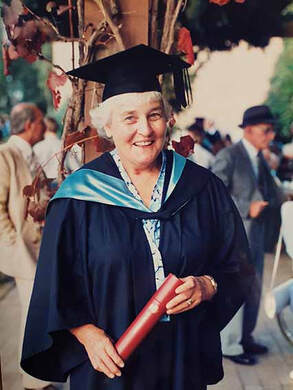| By Miriam Strickland IF OUR mum were still alive we’d be celebrating her 100th birthday this month. As it is, she made it to 76, which isn’t bad. We were all expecting a stroke or heart attack to take her off, but it turned out to be motor neuron disease, for heaven’s sake. And we had no idea until a month before she died. She had the bulbar palsy type of MND, not the type that takes away your arms and legs. The form mum had first manifested as changes in her speech. She commented one day that she was finding it hard to pronounce the letter L. Then we noticed her voice had dropped in pitch and sounded hoarse. With diagnosed angina and a long history of high blood pressure everyone, her doctor included, assumed she had had a slight stroke, enough to affect her speech but not enough to cause any visible paralysis or cognitive change. |
One day she had a different doctor for her regular check-up and medication review, who happened to have done a specialisation in geriatrics. He looked intently at her, asked a few questions, and referred her to a neurologist. The neurologist took one look at her, asked a few questions, and gently advised she get her affairs in order. And sure enough.
Soon speaking at all, and swallowing, became more difficult. Mercifully, the disease took her very quickly: in hindsight we estimated eighteen months from start to finish.
I’m not writing this to talk about MND, though if any of this is helpful to anyone with a connection to someone with MND it will have served a valuable purpose and I’m grateful.
I’m writing about mum because of attending the funeral of a neighbour and friend (via YouTube) recently.
The funeral lasted nearly two and half hours from the entry of the family to the farewell of the hearse. In addition to his widow and their five adult children, one or two siblings, and several work colleagues and community representatives, many attendees also wanted to say something about the deceased, and while I admit I found it hard to stay entirely focused for that long, I recognised that this man had reached a lot of people and it was proper that his life be marked to match. It was a comprehensive and moving tribute.
When my thoughts drifted during the funeral, it was mainly to my own family and our parents’ funerals. And because it was decided at the time that I was too young to attend my father’s, I thought about mum’s.
Soon speaking at all, and swallowing, became more difficult. Mercifully, the disease took her very quickly: in hindsight we estimated eighteen months from start to finish.
I’m not writing this to talk about MND, though if any of this is helpful to anyone with a connection to someone with MND it will have served a valuable purpose and I’m grateful.
I’m writing about mum because of attending the funeral of a neighbour and friend (via YouTube) recently.
The funeral lasted nearly two and half hours from the entry of the family to the farewell of the hearse. In addition to his widow and their five adult children, one or two siblings, and several work colleagues and community representatives, many attendees also wanted to say something about the deceased, and while I admit I found it hard to stay entirely focused for that long, I recognised that this man had reached a lot of people and it was proper that his life be marked to match. It was a comprehensive and moving tribute.
When my thoughts drifted during the funeral, it was mainly to my own family and our parents’ funerals. And because it was decided at the time that I was too young to attend my father’s, I thought about mum’s.
 Happy memories ... Miriam's parents on their wedding day
Happy memories ... Miriam's parents on their wedding day What a stiff and truncated affair it was, by contrast. Not one of us siblings spoke, not even a bible or prayer reading. No-one else in attendance spoke either, nor was invited to. No favourite music, no video montage, no photo displayed on the casket. We did include hymns we knew she had liked, though hearing them played on the church organ only reminded us of our dad, this being the church he was vicar of until he suddenly became ill and died, the church in which his funeral was conducted, and the organ the instrument we later donated in his memory.
These days it’s standard for everyone to speak at funerals, even partners and children of the deceased, and I’m always amazed at their poise and fortitude. We, adult offspring, sat utterly mute in the front pews while the minister read the eulogy and other clergy did the readings. Our relationship with mum had been close but complicated, so with that, the memory of the early loss of our dad, and the shock of mum’s rapid decline, I guess none of us thought we could string coherent words together. Maybe also it was a different time: funerals generally followed a more formal structure in 1996.
Witnessing the friend’s recent, expressive and moving funeral caused me, first, to feel ashamed of having been unwilling to even try to speak at mum’s, but second, simply to ponder what I might have said. How would I have represented my mother? How would any of my siblings? Why have we barely spoken about it in the many years since?
And finally, it caused me to decide that I would suggest to my family, including my grown-up nieces and nephews, mum’s grandchildren, that we make her centenary an opportunity to express something about her in whatever form each of us feels best. A photo or several; an artwork; a speech; something musical; or perhaps a reading of some sort. It doesn’t matter really. I’m hoping that just getting together (remotely, of course) to mark the occasion might open a few windows and let some cobwebs out.
And simply honour her memory in a way we weren’t able to at the time.
These days it’s standard for everyone to speak at funerals, even partners and children of the deceased, and I’m always amazed at their poise and fortitude. We, adult offspring, sat utterly mute in the front pews while the minister read the eulogy and other clergy did the readings. Our relationship with mum had been close but complicated, so with that, the memory of the early loss of our dad, and the shock of mum’s rapid decline, I guess none of us thought we could string coherent words together. Maybe also it was a different time: funerals generally followed a more formal structure in 1996.
Witnessing the friend’s recent, expressive and moving funeral caused me, first, to feel ashamed of having been unwilling to even try to speak at mum’s, but second, simply to ponder what I might have said. How would I have represented my mother? How would any of my siblings? Why have we barely spoken about it in the many years since?
And finally, it caused me to decide that I would suggest to my family, including my grown-up nieces and nephews, mum’s grandchildren, that we make her centenary an opportunity to express something about her in whatever form each of us feels best. A photo or several; an artwork; a speech; something musical; or perhaps a reading of some sort. It doesn’t matter really. I’m hoping that just getting together (remotely, of course) to mark the occasion might open a few windows and let some cobwebs out.
And simply honour her memory in a way we weren’t able to at the time.
